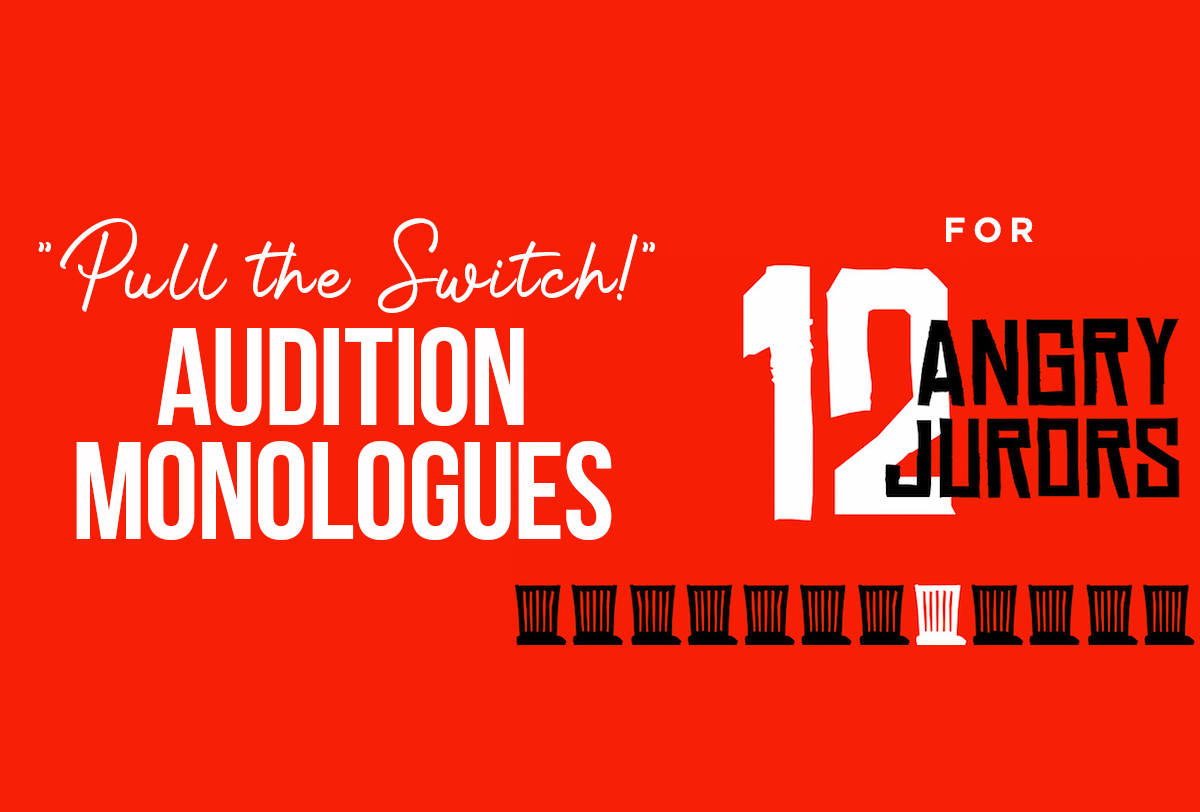“Pull the Switch!”: Audition Monologues for 12 Angry Jurors
Written by Amanda Grace
December 18, 2020
The greatest honor of being an actor comes when one can use their talents to bring justice to another, and Reginald Rose and Sherman L. Sergel’s 1955 script allows companies to do so quite literally. Though unnamed, each of the titular jurors plays a distinct role in an enduringly relevant debate between guilt and innocence; channel their individual characters with this offering of monologue cuts.

Auditioning for Juror #1
From The Chasm Between Us by Debbie Lamedman
Serving as Foreman of the Jury, Juror #1 reveres the rule of law, and strives to maintain an ethically unbiased deliberation room. Tap into 1’s didactic reserve with this piece from another unnamed persona, narrating the socio-psychological mechanics of prejudice to a rapt audience.
Auditioning for Juror #2
From Rise by Crystal Skillman
Juror #2 is the meekest of the group, easily swayed as the majority swifts. Showcase the nuance behind the easily-moved with this speech from Joy, whose ambivalence to her current situation stems from a series of tragedies and hardships.
Auditioning for Juror #3
From Local Heroes by Rodney Rogers
The primary antagonist of the play, Juror #3 is prejudiced to the point that his personally misgivings overstep the boundaries of reasonable suspicion. #3’s aggression is mirrored in Rogers’ script by The Combatant, who viscerally explains their intent to defeat their opponent “[b]y any means necessary.”
Auditioning for Juror #4
From Nine Point Eight Meters per Second per Second by Pete Barry
Juror #4’s morality is somewhat obscured by their pocketbook, which also lends itself to a rather grandiose sense of self. In a slightly more comedic bent on financially-aided egoism, here, Balthazar Kent makes a series of phone calls to his “people” after being ejected from a plane. It takes some serious departure from reality to attempt control in free fall, but #4’s got it in spades.
Auditioning for Juror #5
From Milk Like Sugar by Kirsten Greenidge
#5’s life is fueled by fear, fostered by poverty and the lack of privilege. Ingrown fright can make you want to crawl out of your skin—something Greenidge’s Keera can attest to. In this monologue, Keera lets slip her bottled-up belief that she deserves something much better than the life she was given.
Auditioning for Juror #6
From For Beginners: or, How Not to Kill a Plant by Lindsay Adams
Ignorance is the breeding ground for hate, and Juror #6 is canonically the least thoughtful of the jury. However, simplicity of thought can also be a source of clear values; challenge the cleverness binary with this speech given by Paul, whose goals begin and end at the simple things in life.
Auditioning for Juror #7
From The Waiting Room by Noah Bennett
Juror #7 speaks for the sake of being heard, sometimes at the cost of others’ voices. Give the panel an ironic earful with this monologue delivered by a Judge who very wordily muses on his past convictions as he awaits his impending death.
Auditioning for Juror #8
From Proximity by Kerri Kochanski
The defendant’s saving grace, Juror #8 freely bestows the benefit of the doubt where others find doing so an impossibility. #8’s spirit finds echoes in Margaret, who reacts to a stranger’s intolerance with a wealth of perspective and composure.
Auditioning for Juror #9
From Eighty-Two by Evan Guilford-Blake
Juror #9’s age has resigned them to The Way Things Are—much like in the case of Ben McGinty, a 78-year-old who finds he can’t put up much of a fight when he learns his son and daughter-in-law think it’s time he move in with them.
Auditioning for Juror #10
From White Suits in Summer by Rosary O’Neill
If you’re looking to release some hot-headed, acerbic energy, Juror #10 is your best bet. Dig up your meanest sneer with the help of Susanne, a troubled artist in the middle of accosting her boyfriend’s new wife.
Auditioning for Juror #11
From The RTS Monologue Collection by Angela Cerrito
A refugee accustomed to living on the margins, Juror #11 tends to bow to the pressure of those with greater societal currency. #11 walks into the deliberation room feeling powerless, just as Sabrina does, fighting to hold her own through an unsolicited, abusive encounter in a diner.
Auditioning for Juror #12
From Typewriter Girls by Alexis Clements
Brains don’t make up for a lack of class, as proven by Juror #12. Case-in-Point-II is Fowler, who spends this monologue explaining away his business failures and impending sentencing by reminding his son of his friends in high places.
